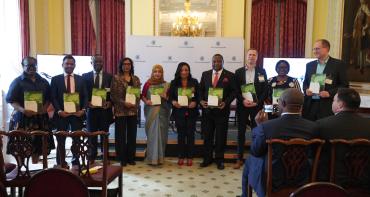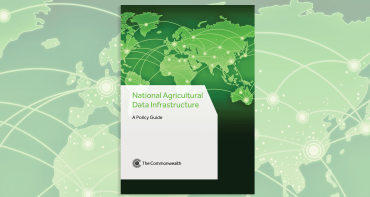In Africa, micro, small and medium-size enterprises (MSMEs) in the informal economy are particularly vulnerable to economic impacts of the COVID-19 pandemic.

Blog by Amrita Saha, Institute of Development Studies and Opeyemi Abebe, Adviser and Head of Trade Competitiveness Section at the Commonwealth Secretariat
In Africa, micro, small and medium-size enterprises (MSMEs) in the informal economy are particularly vulnerable to economic impacts of the COVID-19 pandemic. Consumers are demanding and spending less, leading to decreasing revenues, liquidity problems, reduced output and layoffs.
These small businesses are usually engaged in agriculture, retail trade, transportation or construction. An average of 86 per cent of Africans employed are in the informal economy, with women constituting a large part of these numbers. Safeguarding firms and workers in the informal sector will require a mix of swift context-specific short-term and more medium to longer-term measures that focus on building resilience and capabilities.
A new report commissioned by the Commonwealth Secretariat proposes five recommendations on how governments can help ensure their survival:
1. Health and safety guidelines and support schemes for informal workers
Informal sector workers are highly vulnerable to getting infected as they mostly live and work in congested spaces and lack adequate access to water and clean sanitation. Hygiene and sanitation are critical.
As a short-term strategy, African governments can immediately put in place health guidelines for informal traders, as has been done in South Africa. In the medium to long-term, health insurance schemes that afford significant protection for workers in the informal sector, such as Ghana’s National Health Insurance Scheme, can provide better prenatal care, preventive health check-ups and attention from trained health professionals.
2. Adequate short-term welfare support with coverage from public works programs
To reduce the risk of extreme poverty and food insecurity, governments are announcing online payments, in-kind transfers (food distribution) and social grants. However, access to these measures can be complex and more effective and targeted social safety nets for the informal sector are needed.
Cash transfers can be particularly effective as macro-economic stabilizers, since they can take effect with less delay than other discretionary fiscal measures. However, in the medium to long-term, generating employment through paid work opportunities and public works programmes will be important.
3. Maintaining liquidity for firms and re-thinking operating models
To survive the crisis, small businesses in the informal sector need urgent liquidity support. As of May 2020, fiscal policy stimulus vary greatly across countries, ranging from 0.1 to 4 per cent of GDP.
Such short-term increase in the liquidity of MSMEs and should go through the channels that entrepreneurs already know and trust. This means community-based financial and microfinance institutions should be considered essential services during the crisis, and provided emergency liquidity, if within regulation.
The crisis will force a fundamental rethinking of business and operating models that will transform the small business sector for years to come. Short-term measures may provide immediate support, but do little to build long-term sustainability. This requires a structural reduction the finance gap for MSMEs by extending microfinance systems and including other services such insurance, technical assistance in accessing loans and business trainings.
4. Adjusting to supply chain disruptions plus private sector development interventions
Value chain disruptions have huge impacts, as MSMEs in the informal sector rely on day-to-day sales for survival. To avoid insolvencies in the short-term, these businesses will increasingly rely on stimulus measures that lower operational costs and waive existing debts.
Expanding business links is also possible, whereby large, formal businesses can work with small, informal businesses as their outlets or distributors of essential goods to people’s doorsteps. Stimulus packages should improve working spaces and infrastructure of the informal economy, such as communal markets, in a way that promotes social distancing. This would allow them to become operational in the short-term.
In the long-term, business performance and competitiveness could be enhanced through more comprehensive private sector development interventions. These should combine access to finance, consulting and business training with industry-specific networking, regulations, standards, innovation and linkage programmes.
5. Structural policies for resilience
Resilience will depend on structural policies that support training and resources, provide information and invest in building capabilities. In the short-term, these should help MSMEs adopt new working modes and digital technologies that respond to the new reality of COVID-19, such as teleworking, online retail or home delivery.
However, this requires some basic infrastructure in place (such as internet connection) and familiarity with digital platforms, along with consumer demand for such services. Less than 30 per cent of the African population has access to the internet, compared to 90 per cent in advanced countries and 60 per cent in other developing countries. At the same time, mobile money services are on the rise amongst African small businesses, increasing productivity, turnover and revenues, and credibility.
Medium to long-term digital transformation can help ensure MSMEs can bounce back strongly. Simple digital solutions and training that do not require large upfront capital outlay will make it easier to adapt.
In conclusion, policymakers will have to assess the situation and be innovative and adaptive in responding to gaps in their proposed measures. Overall, short-term measures to help the informal MSME sector should be linked with longer-term resilience programmes for more sustainable post-COVID-19 recovery.



